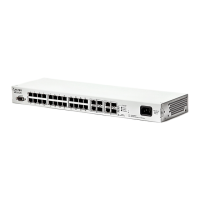138 MES1000, MES2000 Ethernet Switches
[traps|informs]
[version {1 | 2c | 3
[auth | noauth | priv]}] community
[udp-port port] [filter filtername]
[timeout seconds] [retries retries]
community:
(1..20) characters
udp-port: (1..65535)/162
filtername:
(1..30) characters
seconds: (1..300)/15
retries: (0..255)/3
- community—community string for notification
message transmission
- version—define trap message type— trap SNMPv1,
trap SNMPv2, trap SNMPv3
- auto—specify the packet authenticity w/o
encryption
- noauto—do not specify the packet authenticity
- priv—specify the packet authenticity with
encryption
- port—SNMP server UDP port
- seconds—confirmation timeout, after which the
inform message will be re-send
- retries—number of inform messages' transmission
attempts when their confirmation is not received
no snmp-server host
{ipv4_address|ipv6_address|
hostname} [traps|informs]
Remove settings for inform and trap notification
message transmission to SNMPv1/v2/v3 server.
snmp-server v3-host
{ipv4_address|ipv6_address|hostname}
username
[traps | informs] {noauth|auth| priv}
[udp-port port]
[filter filtername]
[timeout seconds]
[retries retries]
hostname:
(1..158) characters
username:
(1..24) characters
udp-port: (1..65535)/162
filtername:
(1..30) characters
seconds: (1..300)/15
retries: (0..255)/3
Define settings for inform and trap notification
message transmission to SNMPv3 server.
- noauth,auth,priv—authentication type, used by
SNMP v3 protocol (noauth—w/o authentication,
auth—authentication w/o encryption, priv—
encrypted authentication)
- port—SNMP server UDP port
- seconds—confirmation timeout, after which the
inform message will be re-send
- retries—number of inform messages' transmission
attempts when their confirmation is not received
no snmp-server v3-host
{ipv4_address|ipv6_address|
hostname} username
[traps|informs]
Remove settings for inform and trap notification
message transmission to SNMPv3 server.
snmp-server engineID local
{engineid-string | default}
Create the local SNMP device identifier—engineID.
- default—when this setting is used, engineID will be
created automatically based on the device MAC
address.
no snmp-server engineID local
Remove the local SNMP device identifier—engineID.
snmp-server engineID remote
{ipv4_address | ipv6_address}
engineid-string
Create the remote SNMP device identifier—
engineID.
no snmp-server engineID remote
{ipv4_address | ipv6_address}
Remove the remote SNMP device identifier—
engineID.
Enable SNMP trap message support.
no snmp-server enable traps
Disable SNMP trap message support.
snmp-server enable traps erps
Enables SNMP trap message transmission on the
ERPS ring state changes.
no snmp-server enable traps erps
Disables SNMP trap message transmission on the
ERPS ring state changes.
snmp-server enable traps flex-link
Enables SNMP trap message transmission on flex-
ring interface pair state changes.
no snmp-server enable traps flex-link
Disables SNMP trap message transmission on flex-
ring interface pair state changes.
snmp-server enable traps link-status
Enable SNMP trap message transmission on the port
state changes.
no snmp-server enable traps link-
status
Disable SNMP trap message transmission on the port
state changes.
snmp-server enable traps mac-
notification change
Enables SNMP trap message transmission on
changes in table of learnt MAC addresses.
no snmp-server enable traps mac-
notification change
Disables SNMP trap message transmission on
changes in table of learnt MAC addresses.
snmp-server enable traps storm-
Enables SNMP trap message transmission upon

